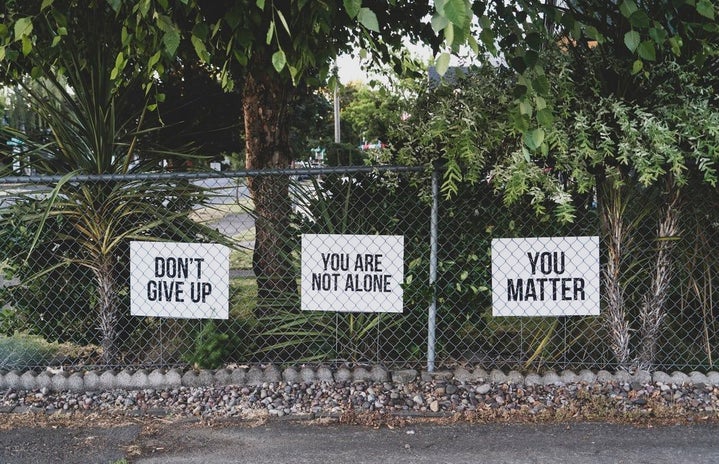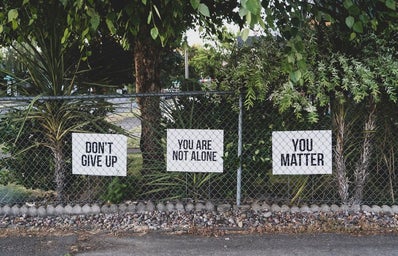Trigger warning: this article handles discussion of suicide and self-harm. If you or someone you know is struggling, see below for a list of available resources.
I’d like to begin with one of my most favorite and affirming quotes: “If you feel like you don’t fit into this world, it’s because you’re here to create a better one.”
Having suicidal thoughts is more common than we may realize. Contrary to some beliefs, talking about suicide does not make suicide thoughts or attempts more common. It actually helps people struggling to feel validated and breaks the stigma. Avoid saying someone was successful in their attempt of suicide because saving their life is the goal. Tell yourself or your friend that it’s healthier to talk about how they are feeling instead of not. Learning about why suicide happens and what to look out for will allow you to help someone when they need it! When your friend explains to you how they are feeling, do not act shocked even if you feel that way because this will create distance between you. The best thing to do is to take them seriously and say that you hear what they are going through. The person having suicidal thoughts has probably been fighting this for a while and a shocked reaction will not help them feel reassured, instead it will make them feel stigmatized and more alone. It’s okay if you are experiencing suicidal thoughts, but the most important thing is to get help right away. You can dial 988 to reach the Suicide Prevention Hotline for a free, confidential phone call with a trained counselor who will listen without judgement. YOU ARE NOT ALONE; more than 2 million people call every year. There are many resources made to help you because YOUR LIFE MATTERS! Please do not hesitate to reach out.
WHO IS AT RISK?
Anyone can experience suicidal thoughts or ideation, however some groups are more at risk than others because of mental illness, their experiences, or their life’s circumstances. People known to be more at risk are: People with disabilities, BIPOC communities, College students, LGBTQIA+ Folks, Attempt survivors, Older adults (over the age of 55), are also at higher risk including Native American and Alaskan Native populations, because they are often overlooked and do not receive as many resources as they need. Generational trauma can also play a role in mental illness or suicidal thoughts. “The LGBTQ+ community is diverse and strong, but may be disproportionately at-risk for suicidal feelings and other mental health struggles because of the discrimination and prejudice they too often are up against.” Listed on www.SuicidePreventionLifeline.org, “Over 80% of LGBTQ+ youth have been assaulted or threatened, and every instance of victimization in an LGBTQ+ person’s life more than doubles the likelihood of self-harming.”
WHAT TO LOOK OUT FOR:
-
IF YOU HEAR SOMEONE… (Taken from @igniting.flames on Instagram)
-
Talking about wanting to die or kill themselves (EVEN AS A JOKE), say “Do you really feel that bad that you are considering this?” Take them seriously!
-
Searching for ways to self harm (causing pain to themselves, acting recklessly, not eating, obtaining weapons or other objects used to cause pain on themselves).
-
Talking about feeling trapped or always feeling alone.
-
Talking about being hopeless for a reason to live.
-
Saying or even hinting that they are a burden to others.
-
Behaving recklessly, even as a “joke.”
-
Saying “I know I won’t be missed,” or “No one truly cares about me.”
-
Saying “It’s too late for me to be happy,” or “I am too far gone.”
-
Increasing their use of drugs or alcohol.
-
Withdrawing themselves thinking everyone will “be better off.”
-
Giving away their important possessions.
-
Sleeping way too much or way too little.
(My account @igniting.flames is to talk about mental illness as a way to break the stigma. I use this account as a safe space to show people that they are not alone. Please message me if you want, my DMs are open to those who need someone to listen!)
Risk Factors include:
-
Loss of a loved one, a relationship or job
-
Family history of child maltreatment or neglect
-
Traumatic experiences, such as witnessing or experiencing violence
-
A sense of isolation
-
Lack of social support
-
Feelings of hopelessness
-
Access to lethal means like guns and pills
-
Family history of suicide
-
A history of mental health problems
-
Barriers to accessing mental health treatment
-
Stigma associated with seeking help
How to support when someone tells you they’re feeling suicidal:
-
Be willing to listen with no judgement or interruptions by saying things like,“I hear you.”
-
Take them seriously!
-
Listen to their reasons for staying alive and focus on that.
-
Don’t act shocked. This will make them feel uncomfortable and create distance.
-
Offer hope that resources are available.
-
Take action and look at the resources with your friend to show them you are here to help!
-
If you see dangerous items in their space (knives, guns, razors, ropes, scissors, non-RX pills), take these items away from them.
-
BE THERE- physically with them or through a phone call. Maybe offer to take them out for a short walk.
-
Connect with them to break their isolation.
-
FOLLOW UP! You can say things like, “I’ve been thinking of you. Do you have time to chat now?”
Ways to help yourself or a loved one:
-
Make a safety plan: This link is to a helpful template to KEEP YOU SAFE because YOU ARE WORTH IT! Filling out this template before a crisis will help you when in need by putting the supports in place before anything happens. This is a great form of self care: Patient Safety Plan Template
“Helping a loved one through a crisis is never easy. You might want to talk about your feelings with another friend or a counselor.” Never disclose a person’s struggle without their permission unless you think they are in immediate danger. If you do think they are in immediate danger and you’re unable to go check on them, you can call the police and ask them to do a wellness check, however consider how this situation may turn out depending on the person’s situation. Calling 988 may be more helpful, or if the person has caused themselves harm, DO NOT BE AFRAID to call the ambulance. This person’s life is worth the cost, even though they may not think they deserve this help. Wellness Check: FAQs
RESOURCES for Information:
-
www.afsp.org (American Foundation for Suicide Prevention)
-
The Trevor Project (LGBTQ Youth): (866) 488-7386, or (866) 4-U-Trevor
-
TEXT “HOME” to 741-741 or CALL 988 for the suicide prevention hotline available 24 hours.
-
For Domestic Violence: https://www.thehotline.org
-
To support your LGBTQ+ friends: An Ally’s Guide to Terminology: Talking About LGBT People & Equality
Resources for finding a therapist:
If you want to become a Suicide Prevention Advocate, here is a link to sign up through American Foundation for Suicide Prevention or through the program Nine out of Ten:
Sources used:
https://suicidepreventionlifeline.org/help-yourself/attempt-survivors



